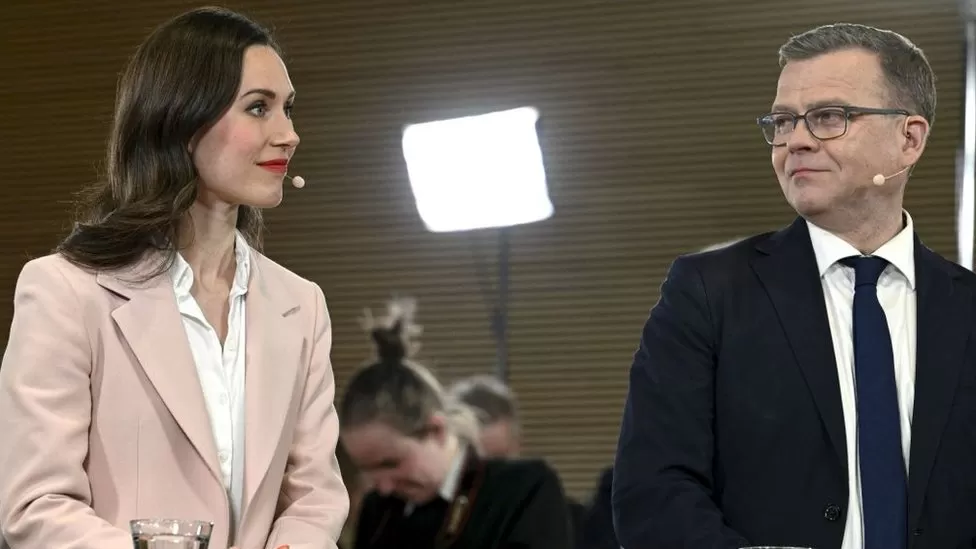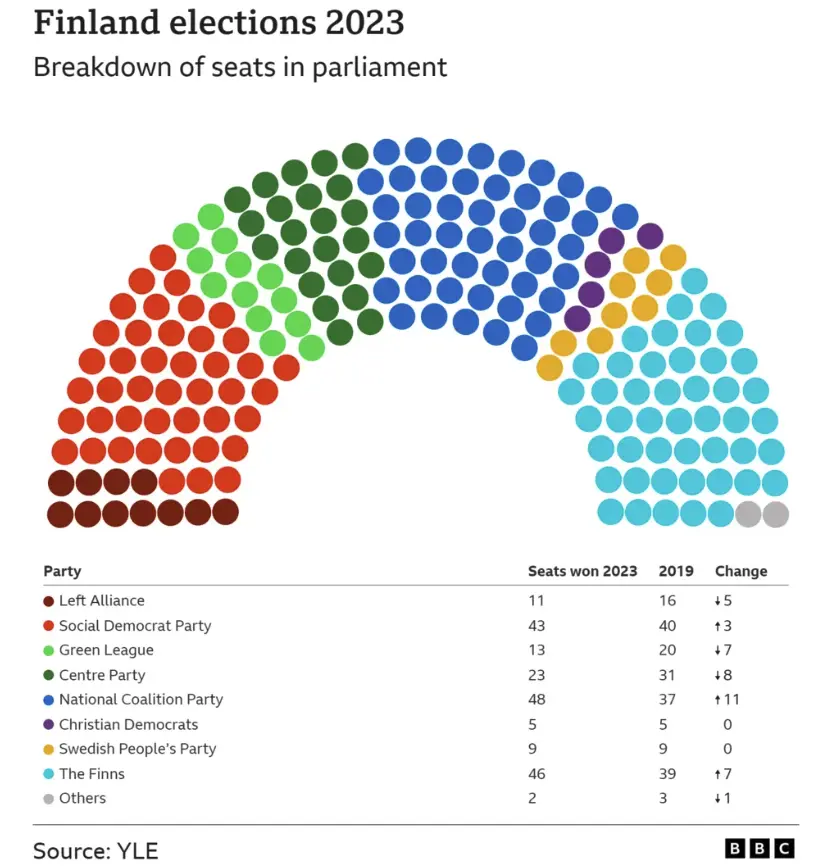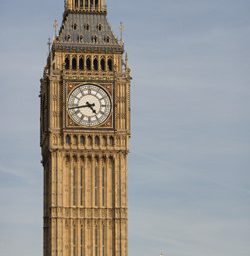Finland’s Ordinary Election
A refreshing instance of normal democratic politics amid interesting times.

BBC (“Sanna Marin defeated by Finland’s conservatives in tight race“):
Finnish conservative leader Petteri Orpo has won a nail-biting three-way election race, defeating Prime Minister Sanna Marin’s centre left.
“We got the biggest mandate,” said the leader of the National Coalition Party, after a dramatic night in which the result gradually swung away from Ms Marin’s Social Democrats.
Mr Orpo secured 20.8% of the vote, ahead of the right-wing populist Finns Party and the centre left.
The populists won a record 20.1%.
It is a bitter defeat for Ms Marin, who increased her party’s seats and secured 19.9% of the vote.
She continues to enjoy high poll ratings and has been widely praised for steering Finland towards imminent entry into Nato and navigating her country through the Covid-19 pandemic.
Shortly after the conservative leader claimed victory, the centre-left leader conceded the election.
“Congratulations to the winner of the elections, congratulations to the National Coalition Party, congratulations to the Finns Party. Democracy has spoken,” she told supporters.
For weeks the three parties had been almost level in the polls, and as the results came in it became too close to call. Then a projection from public broadcaster YLE gave Petteri Orpo’s National Coalition victory with the biggest number of seats in parliament.
“I think Finnish people want change. They want change and now I will start negotiations, open negotiations with all parties,” he said.
There was a mood of euphoria in the camp, said Matti Koivisto, political correspondent with public broadcaster YLE. “When they saw the projection, it was quite clear they were going to win.”
Finns Party leader Riikka Purra congratulated her centre-right rival and was herself delighted with the best result in her party’s history.
“We’re still challenging to be number one, but seven more seats is an excellent result.”
The Finns underlined their success by winning more regions than any other party in mainland Finland. Riikka Purra won more votes than any other candidate and commentators highlighted her party’s appeal to young voters by reaching out over social media such as TikTok.
Meanwhile, three of the other parties in the outgoing coalition – the Centre Party, Left Alliance and Greens – all rang up big losses.
[…]
Despite her successful response to neighbouring Russia’s invasion of Ukraine, the election was largely fought on Finland’s economy and public debt as all the mainstream parties backed Nato membership.
[…]
The conservatives will have the first opportunity in forming a government, and if they succeed, Mr Orpo, 53, will become the next prime minister.
Under an Orpo-led government, Europe could expect a pro-European conservative from the liberal centre of his party with an emphasis on economic policy.
Less exciting than Sanna Marin and very moderate, says Vesa Vares, professor of contemporary history at the University of Turku: “A sort of dream son-in-law.”
Under Finland’s system of proportional representation he will have to muster more than 100 seats in the 200-seat parliament to run the country, and that will not be straightforward.
Mr Orpo really has two choices ahead of him, either forming a right-wing coalition with Riikka Purra’s nationalist Finns Party or reaching an agreement with Sanna Marin’s Social Democrats.
“The Finns are a very difficult partner because they’re so inexperienced and they have MPs who are discontented towards almost anything,” says Prof Vares.
“The most natural thing would be to co-operate with the Social Democrats. But [Sanna Marin] used to belong to her party’s left wing and it’s obvious she doesn’t like the conservatives.”
I don’t make any claim to following Finnish politics closely but I’m struck by how refreshingly ordinary this all is amidst so much turmoil in Western politics in recent years. All of the party leaders who had a plausible chance to emerge as prime minister agreed on NATO membership, and thus support for Ukraine, rendering it a non-issue.
The sitting prime minister, controversial mostly because of her youth, remains popular but couldn’t sustain a plurality in the midst of a weak economy—yet she immediately and graciously conceded her loss and made the requisite homage to the virtues of democracy.
The populist candidate came in third but was happy for the increased strength in the parliament. A virtue of having multiple parties with a path to representation in the government is that it’s not winner-take-all.
Here’s the graphical breakdown:

A whopping ten parties will have representation. And, because there’s plausibility of winning seats, those who represent fringe views—whether from the left or the right—can go their own way rather than taking over the major parties. (The populist Finns are a bit hard to characterize, having far-right origins but have morphed into a more traditional nativist-populist party in recent years.)
Note also that there are 200 seats for a population of only ~5.54 million, or one representative for every ~27,706 people. Contrast that with 435 representatives for ~332 million, or one for every ~763,218 people here.






Once upon a time we had boring, basically centrist, politics. I recall thinking in late 2000 that it was not good, but OK, that W would be prez. We’d had Republican presidents before. We had survived Reagan. W would probably be like his daddy, conservative, pro-business, but basically mainstream. We’d done this dance for decades. Rs would raise defense spending a bit, Ds would be more pro-labor, but the baseline course was set and it wouldn’t make a lot of difference. Eight years later we were fighting two wars, big tax cuts had driven huge deficits, and the country was in the Great Recession. And later we got Trump.
Prior to W it was nice to feel, as Finlanders apparently do, that we weren’t on the brink of disaster in every election. Twenty years ago almost nobody, even in Wisconsin, cared who won a WI supreme court seat.
Sometimes. And sometimes a major party just needs a few votes more to gain the majority and so they give away everything to a tiny extremist party who otherwise would have no sway on laws and policy. See: Israel.
@MarkedMan: Honestly, I think Israel was always going to devolve into a neo-fascist state. Democracy and Zionism simply aren’t mutually compatible unless you’re in a pure nation-state, which Israel has never been. And decades of occupation and terrorist attacks pretty much put the country on a permanent war footing. Like it or not, I think Netanyahu and company are the natural result of all of that.
@James Joyner: That’s fair. I admit that my view of parliamentary democracies is very likely overweighted towards the Israeli dictatorship of the minority and the ungovernable chaos that was Italy for several decades.
@MarkedMan:
@MarkedMan:
Another issue with Israel, is the willingness to create governments with microscopic majorities. Israel’s current governmental instability is a result of Netanyahu refusing to step down, Likud refusing to remove him as party leader and none of the other centrist parties being willing to be part of a Netanyahu led government.
But Finland is a great example of boring, responsible government. One reason that Finns rank highly on personal happiness.
Well, Finland is a small, culturally, socially, and ethnically homogenous country. The population is 200k less than my own state of Colorado. And here in Colorado, our state level-elections, including for governor, were pretty “ordinary.”
So I guess I don’t see what is so surprising.
@Andy: Finland is certainly easier to govern than the US, UK, or Italy–places where far right populism has been the most pernicious in recent years. It’s just an interesting outlier from what seems to be the current norm in Western democracies.
I will just note that the 2nd place party is The Finns (it even sounds ominous 🙁 [dun dun duuuhhhhhnnnnnnn]). Our friend Wikipedia tells me that The Finns
Sound like anybody we know?
@MarkedMan: Israel is best advertisement for a two-party system.